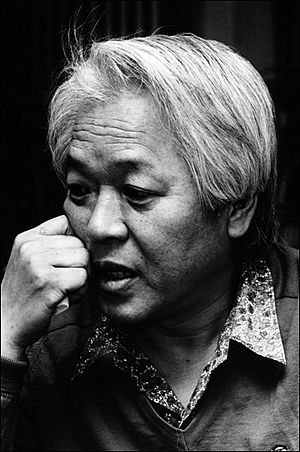Yi Chong-jun facts for kids
Quick facts for kids
Yi Chong-Jun
|
|
|---|---|
 |
|
| Born | August 9, 1939 Jangheung, Japanese Korea |
| Died | July 31, 2008 (aged 68) Seoul, South Korea |
| Language | Korean |
| Nationality | South Korean |
| Alma mater | Seoul National University |
| Period | 1965–2008 |
| Notable works | The Wounded (1966) Seopyeonje (1976) Your Paradise (1976) |
| Korean name | |
| Hangul | |
| Hanja | |
| Revised Romanization | I Cheong-jun |
| McCune–Reischauer | Yi Ch'ong-chun |
Yi Chong-jun (born August 9, 1939 – died July 31, 2008) was a very important novelist from South Korea. He wrote for over 40 years. During his long career, Yi Chong-jun created more than 100 short stories and 13 novels. His works often explored deep ideas about society, art, and human life.
Contents
Life of Yi Chong-jun
Yi Chong-jun was born in 1939. He studied German literature at Seoul National University. In 1965, he started his writing career. His first short story was called Toewon, which means "Leaving the Hospital."
Just two years later, he won a major award, the Dongin Literature Award. He received it for his story The Wounded (Byeongsingwa Meojeori). Yi Chong-jun passed away from lung cancer in 2008, when he was 68 years old.
Exploring Yi Chong-jun's Works
Yi Chong-jun was a leading writer of his time. He wrote many stories and novels. His topics were very diverse and covered many important ideas.
Themes in His Writing
One of his early works, The Wounded (1966), looked at the feelings of young Koreans after the war. Another book, Your Paradise (1976), explored ideas of kindness and power. This story was set in a leper colony on Sorokdo Island.
In The Fire Worshipers (1985), Yi Chong-jun thought about why people have rituals. He wondered about their meaning in a world where answers are not always clear. His stories often touched on political, personal, and deep philosophical questions.
Language and Truth
A key idea in his books was how language helps us find truth. In The Walls of Rumor (1972), he showed how free speech was limited in Korea. This was during a time when the country was divided.
His collection In Search of Lost Words (1981) continued this idea. It explored how political problems can hurt language. When language is twisted, it can also harm people's minds. Yi Chong-jun showed how political systems can affect people deeply.
Art and Life
Another favorite topic for Yi Chong-jun was the role of art. Early stories like "The Falconer" and "The Target" featured artists. These artists worked hard to perfect their skills. Sometimes, this dedication came at the cost of their own happiness.
Later, Yi Chong-jun found inspiration in traditional Korean folk art. His famous story "Seopyeonje" (1993) is a great example. It focuses on pansori, a traditional Korean musical storytelling. In the story, artistic expression helps people deal with life's difficulties. It also helps them rise above them. The movie based on "Seopyeonje" was very popular. It helped many people become interested in pansori again.
Works Translated into English
Here are some of Yi Chong-jun's stories and novels that you can read in English:
- The Snowy Road and Other Stories (단편소설선 <눈길>)
- Your Paradise
- The Prophet and Other Stories (이청준 소설선 <예언자> 외)
- Seopyeonje (서편제)
- The Cruel City and Other Korean Short Stories (한국대표단편선(2))
- Two Stories from Korea: "The Wounded" and "The Abject"
Movies Based on His Works
Many of Yi Chong-jun's stories have been made into movies or TV shows. Famous directors have brought his words to the screen.
- Iodo (1977), directed by Kim Ki-young.
- Seopyeonje (1993), directed by Im Kwon-taek. This film is about a pansori master. He travels with his adopted son and daughter.
- Beyond the Years (2007), also by Im Kwon-taek. This movie was based on his story The Wanderer of Seonghak-dong.
- Secret Sunshine (2007), directed by Lee Chang-dong. The plot came from Yi Chong-jun's short story A Story of a Worm.
A critic named Kim Byeong-ik said that Yi Chong-jun helped shape Korean literature. He set a new standard before modern Korean literature truly began in the 1960s.
Awards and Recognition
Yi Chong-jun received many important awards for his writing:
- Dong-in Literary Award for “The Wounded” (1967)
- Yi Sang Literary Award for “The Cruel City” (1978)
- Korean Literature Prize for “The Fire Worshipers” (1985)
- Isan Literature Prize for “The Gate of Liberty” (1990)
- Ho-am Prize in the Arts (2007)
See also
 In Spanish: Yi Chong-jun para niños
In Spanish: Yi Chong-jun para niños

